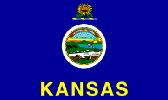Free Kansas Last Will and Testament

What is a Last Will and Testament?
With the understanding that it's prepared and executed properly by an adult of sound mind, a Kansas Last Will and Testament is a legal document that stipulates the way your properties and assets will be handled after your passing. The person who dies is formally referred to as the decedent. The testator can also appoint a guardian for their minors in the will to make certain there is somebody who can look after the children till they grow to be adults or until they reach a specific age.
In the event that a person dies without a legitimate Kansas Last Will (which in the majority of states implies the document must be correctly witnessed, not only signed), somebody will normally be appointed by the court to be the personal agent and pay off the decedent’s debt, using assets as required to do so. Afterward, the leftover assets will be spread among the decedent’s heirs based on the laws of the state the testator lived in.
In some states, when one spouse passes away leaving behind their significant other, that living spouse will receive all the decedent’s assets without a Will document stating the opposite. Furthermore, the testator could have selected a particular beneficiary to acquire a life insurance policy, retirement account, or some other asset, and that inheritor designation will dictate who receives those assets without a Will document.
The critical thing to note is that any person who wants to designate the way in which their possessions will be handled after their passing should certainly write and properly finalize a Last Will to make certain their wishes are known and followed. Without getting a last will, you most likely are leaving it up to chance, the legislation of the state, or a court of law as to how your last matters will be settled.
Legal Requirements for Last Will in Kansas
Every Kansas citizen who feels responsible for one’s assets after his/her death can take into consideration the filling the Last Will and Testament form. If properly built, this form becomes an official document, reflecting the last will of the person after one’s death. This paper might be created by an adult (18 years old+) person, completely sane and responsible for one’s actions. In the document, the adult states one’s assets and the ways they are supposed to be distributed. The deceased person is usually named a “decedent” in the official documents and later in this article.
The decedent, when creating the Last Will document, has to clearly state the person, responsible for the further affairs of the deceased. This “responsible” person, usually called a representative, will take care of paying all the remaining debts of the decedent in accordance with the rules, using the decedent’s property. After the debts are paid, the rest of the assets are distributed between the heirs. The representative also called an “executor,” has to control the order of asset transferring and the amount of property so that the will of the deceased person was implemented correctly. If the decedent wants to state more than one executor, it is also possible — in this case, these people are referred to as “co-representatives.”
The decedent also has to choose the guardians in advance. The guardians are the people who will be raising the children of a deceased person in case of one’s premature death if the children are not capable of caring about themselves yet (usually, up to 18 years old). This is a responsible mission, so it is important to choose the candidates for guardianship responsibly and wisely. Usually, these are relatives or closest family friends.
If it turns out the deceased person did not prepare a Last Will document, the court has the right to name the representative, who will be managing the debts payments and the inheritance procedure. In many cases, these are the spouses or the closest relatives or friends.
Each state of the United States of America has its own laws concerning the Last Will and Testament creation and the verification procedures. In Kansas, there are relatively strict rules concerning this document. First of all, the Last Will document has to be signed by a testator and two witnesses instead of one, as in the majority of the states. After that, the paper has to be brought to the lawyer and verified (notarized) here. These steps are obligatory if one wants his/her Last Will paper to be legal.
Kansas Last Will and Testament laws also allow for creating oral wills — this procedure is used when the testator is incapable of creating a written document.
Thus, every Last Will document has to include the following notions:
-
A representative (or representatives) stated clearly with all required information.
-
A guardian (or guardians), also with all required information
-
The list of assets in private property
-
The will of the asset distribution and the information about the inheritors
-
The signatures — of the person, creating the document, and two witnesses (for Kansas citizens)
It is advised to keep the Last Will and Testament in a well-protected place to avoid invasions and faking the document.
